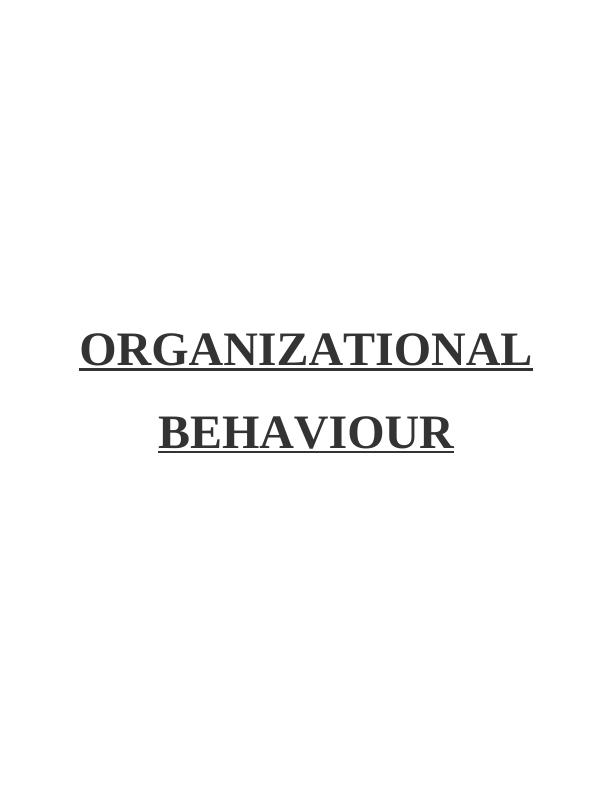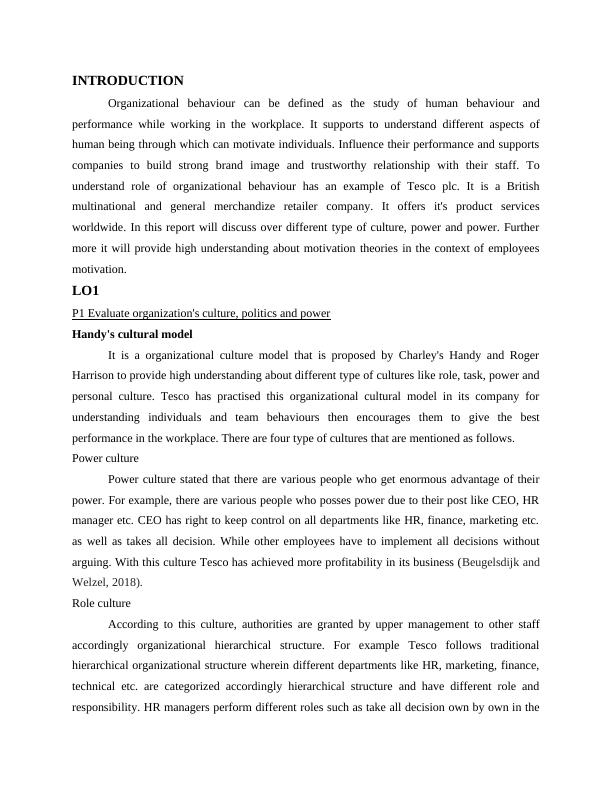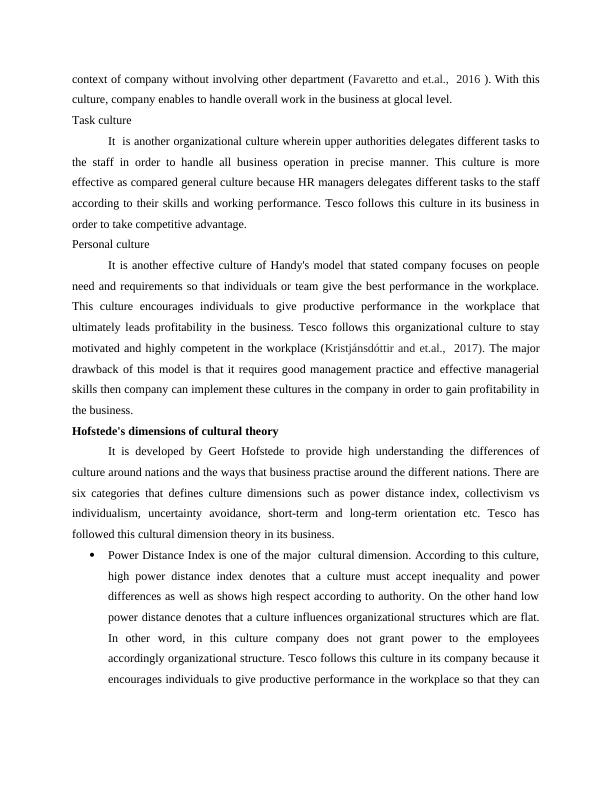Organizational Behaviour: Culture, Politics, Power, and Motivation Theories
Added on 2023-01-06
15 Pages4204 Words47 Views
ORGANIZATIONAL
BEHAVIOUR
BEHAVIOUR


INTRODUCTION
Organizational behaviour can be defined as the study of human behaviour and
performance while working in the workplace. It supports to understand different aspects of
human being through which can motivate individuals. Influence their performance and supports
companies to build strong brand image and trustworthy relationship with their staff. To
understand role of organizational behaviour has an example of Tesco plc. It is a British
multinational and general merchandize retailer company. It offers it's product services
worldwide. In this report will discuss over different type of culture, power and power. Further
more it will provide high understanding about motivation theories in the context of employees
motivation.
LO1
P1 Evaluate organization's culture, politics and power
Handy's cultural model
It is a organizational culture model that is proposed by Charley's Handy and Roger
Harrison to provide high understanding about different type of cultures like role, task, power and
personal culture. Tesco has practised this organizational cultural model in its company for
understanding individuals and team behaviours then encourages them to give the best
performance in the workplace. There are four type of cultures that are mentioned as follows.
Power culture
Power culture stated that there are various people who get enormous advantage of their
power. For example, there are various people who posses power due to their post like CEO, HR
manager etc. CEO has right to keep control on all departments like HR, finance, marketing etc.
as well as takes all decision. While other employees have to implement all decisions without
arguing. With this culture Tesco has achieved more profitability in its business (Beugelsdijk and
Welzel, 2018).
Role culture
According to this culture, authorities are granted by upper management to other staff
accordingly organizational hierarchical structure. For example Tesco follows traditional
hierarchical organizational structure wherein different departments like HR, marketing, finance,
technical etc. are categorized accordingly hierarchical structure and have different role and
responsibility. HR managers perform different roles such as take all decision own by own in the
Organizational behaviour can be defined as the study of human behaviour and
performance while working in the workplace. It supports to understand different aspects of
human being through which can motivate individuals. Influence their performance and supports
companies to build strong brand image and trustworthy relationship with their staff. To
understand role of organizational behaviour has an example of Tesco plc. It is a British
multinational and general merchandize retailer company. It offers it's product services
worldwide. In this report will discuss over different type of culture, power and power. Further
more it will provide high understanding about motivation theories in the context of employees
motivation.
LO1
P1 Evaluate organization's culture, politics and power
Handy's cultural model
It is a organizational culture model that is proposed by Charley's Handy and Roger
Harrison to provide high understanding about different type of cultures like role, task, power and
personal culture. Tesco has practised this organizational cultural model in its company for
understanding individuals and team behaviours then encourages them to give the best
performance in the workplace. There are four type of cultures that are mentioned as follows.
Power culture
Power culture stated that there are various people who get enormous advantage of their
power. For example, there are various people who posses power due to their post like CEO, HR
manager etc. CEO has right to keep control on all departments like HR, finance, marketing etc.
as well as takes all decision. While other employees have to implement all decisions without
arguing. With this culture Tesco has achieved more profitability in its business (Beugelsdijk and
Welzel, 2018).
Role culture
According to this culture, authorities are granted by upper management to other staff
accordingly organizational hierarchical structure. For example Tesco follows traditional
hierarchical organizational structure wherein different departments like HR, marketing, finance,
technical etc. are categorized accordingly hierarchical structure and have different role and
responsibility. HR managers perform different roles such as take all decision own by own in the

context of company without involving other department (Favaretto and et.al., 2016 ). With this
culture, company enables to handle overall work in the business at glocal level.
Task culture
It is another organizational culture wherein upper authorities delegates different tasks to
the staff in order to handle all business operation in precise manner. This culture is more
effective as compared general culture because HR managers delegates different tasks to the staff
according to their skills and working performance. Tesco follows this culture in its business in
order to take competitive advantage.
Personal culture
It is another effective culture of Handy's model that stated company focuses on people
need and requirements so that individuals or team give the best performance in the workplace.
This culture encourages individuals to give productive performance in the workplace that
ultimately leads profitability in the business. Tesco follows this organizational culture to stay
motivated and highly competent in the workplace (Kristjánsdóttir and et.al., 2017). The major
drawback of this model is that it requires good management practice and effective managerial
skills then company can implement these cultures in the company in order to gain profitability in
the business.
Hofstede's dimensions of cultural theory
It is developed by Geert Hofstede to provide high understanding the differences of
culture around nations and the ways that business practise around the different nations. There are
six categories that defines culture dimensions such as power distance index, collectivism vs
individualism, uncertainty avoidance, short-term and long-term orientation etc. Tesco has
followed this cultural dimension theory in its business.
Power Distance Index is one of the major cultural dimension. According to this culture,
high power distance index denotes that a culture must accept inequality and power
differences as well as shows high respect according to authority. On the other hand low
power distance denotes that a culture influences organizational structures which are flat.
In other word, in this culture company does not grant power to the employees
accordingly organizational structure. Tesco follows this culture in its company because it
encourages individuals to give productive performance in the workplace so that they can
culture, company enables to handle overall work in the business at glocal level.
Task culture
It is another organizational culture wherein upper authorities delegates different tasks to
the staff in order to handle all business operation in precise manner. This culture is more
effective as compared general culture because HR managers delegates different tasks to the staff
according to their skills and working performance. Tesco follows this culture in its business in
order to take competitive advantage.
Personal culture
It is another effective culture of Handy's model that stated company focuses on people
need and requirements so that individuals or team give the best performance in the workplace.
This culture encourages individuals to give productive performance in the workplace that
ultimately leads profitability in the business. Tesco follows this organizational culture to stay
motivated and highly competent in the workplace (Kristjánsdóttir and et.al., 2017). The major
drawback of this model is that it requires good management practice and effective managerial
skills then company can implement these cultures in the company in order to gain profitability in
the business.
Hofstede's dimensions of cultural theory
It is developed by Geert Hofstede to provide high understanding the differences of
culture around nations and the ways that business practise around the different nations. There are
six categories that defines culture dimensions such as power distance index, collectivism vs
individualism, uncertainty avoidance, short-term and long-term orientation etc. Tesco has
followed this cultural dimension theory in its business.
Power Distance Index is one of the major cultural dimension. According to this culture,
high power distance index denotes that a culture must accept inequality and power
differences as well as shows high respect according to authority. On the other hand low
power distance denotes that a culture influences organizational structures which are flat.
In other word, in this culture company does not grant power to the employees
accordingly organizational structure. Tesco follows this culture in its company because it
encourages individuals to give productive performance in the workplace so that they can

End of preview
Want to access all the pages? Upload your documents or become a member.
Related Documents
Behaviour of Employees and Staff of Enterprise Car Rental and City Collegelg...
|13
|3890
|372
Organisational Behaviour: Culture, Power, Politics, Motivation Theories, Effective vs Ineffective Teams, Philosophieslg...
|12
|3206
|31
Influence of Power, Culture and Politics on Individual and Team Performancelg...
|19
|4760
|33
Organizational Behaviour: Influence of Culture, Politics, and Powerlg...
|15
|5024
|81
Organisational Behaviour: Culture, Power, and Motivation in Tescolg...
|15
|4125
|89
Impact of Culture, Politics, and Power on Individuals and Team Performancelg...
|10
|2834
|41
